AI is not a thing of the future - it’s already here and here to stay, transforming virtually every industry.
This means that the best time to start adopting AI was yesterday. The second best is right now.
However, to do that correctly and harness AI’s full potential, you must first learn to use it.
In this article, I'll teach you how to learn AI by providing actionable tips and insights and outlining all the essentials to ensure you’ll master it in no time.
So, let’s begin by explaining why learning AI has become a must in 2025.
Why is learning AI important?
Before you delve into the problem of how to learn AI, you need to know why you’re doing it in the first place.
There are several reasons why putting time and effort into AI education is a wise investment, including the following:
1. AI gives you a competitive advantage in a tech-driven market
Adopting AI can be a game-changer for businesses of all sizes and industries, which is why it’s no surprise that its adoption has been on a steady rise for years.
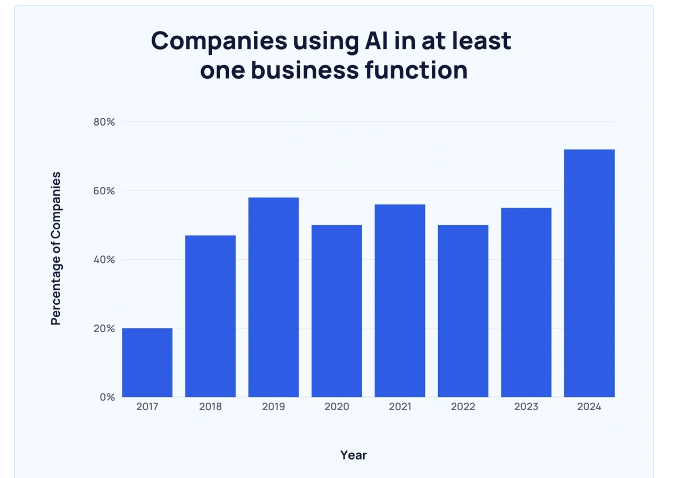
Namely, AI tools can help with a wide range of things, such as:
- Automate repetitive tasks.
- Optimize decision-making.
- Improve customer experiences, etc.
Therefore, by investing in AI education, businesses can stay ahead of competitors who still rely on traditional methods, which are, by default, incapable of keeping up with the increasing pace of an innovation-driven market.
2. AI helps uncover new opportunities and generate new revenue streams
Teams that really understand AI and its capabilities can leverage it to offer personalized services, analyze market trends, or even develop innovative AI-driven products.
Learning how AI works can help business owners identify new ways to scale their operations and tap into new markets, thanks to its ability to analyze large data sets, recognize patterns, and pinpoint anomalies.
This enables businesses to use AI as a powerful tool for predictive analytics, allowing them to:
- Uncover markets that are not as saturated.
- Anticipate potential customers’ needs before they are aware of them.
- Detect opportunities for upselling and cross-selling.
3. AI enables streamlining various business operations
Anyone who’s ever run a business knows how difficult it can be to optimally allocate limited resources.
AI offers a solution by streamlining operations, enabling you to reduce costs by enhancing productivity.
Namely, investing in learning AI allows you to implement AI-powered automation tools, predictive analytics, and other intelligent systems that can handle routine tasks, freeing up time for critical activities that actually demand human attention.
This means you won’t necessarily have to grow your team as your business scales - you can simply leverage AI, and it will handle all the repetitive tasks for you, allowing you to do more with fewer resources.
For example, here's how you can write articles in about 3 minutes inside of Team-GPT alongside your team:
4. AI can enhance personalization across levels
In today’s market, personalized customer experiences are critical to success, and AI enables businesses to deliver nothing less than that.
If you get the hang of how AI works and what it can do for you, you can make the most of AI-driven customer insights, which allow for targeted marketing, tailored product recommendations, and predictive customer support.
This means that learning how to use AI to better engage customers can lead to increased loyalty and higher conversion rates, which is crucial for businesses trying to build a strong customer base.
5. AI lets you create a resilient, future-proof business
Finally, if you’re not in the game, you’re out, meaning that falling behind in today’s competitive market usually means the end for your business.
AI is becoming a cornerstone of modern business, and learning it now ensures that you and your team will be ready for the future and all the innovation that is yet to come.
Investing in AI education enables you to future-proof your operations, adapt to industry changes, and continuously innovate.
This approach secures long-term success and ensures your business remains agile in a fast-evolving market.
What basic skills do you need to learn AI?
This question is most often asked when you’re new to learning AI.
Truth be told, there are some skills and previous experience in certain areas that could help you learn AI faster, such as:
- Basic understanding of math and statistics since AI heavily relies on mathematical concepts.
- Some programming knowledge would be welcome, as it’s necessary for AI development.
- Being familiar with the concept of data management because data and AI are very closely connected and mutually influenced.
However, even if you don’t have any experience with any of these, not all is lost, as these skills can be acquired in time.
The only thing that matters when learning AI is your mindset.
Namely, you can overcome all these challenges and gain all the necessary expertise in relatively little time, provided you’re:
- Willing to learn and learn continuously, as AI is a constantly evolving field.
- Comfortable with technology, such as digital tools, online learning platforms, etc.
- Patient and don’t expect everything to happen overnight.
That being said, there are tools, methods, and techniques you can leverage to speed up the entire process.
Enter Team-GPT.
How to learn AI with Team-GPT?
Team-GPT is an enterprise AI platform that helps teams of all sizes adopt AI and make the most of its capabilities by tailoring it to their specific use cases and requirements.
The platform was built with users of various skill levels in mind, aiming to help everyone become an AI expert and find value in it.
As such, it’s helped teams across dozens of industries to implement any and all AI models in a way optimal for their goals.
Team-GPT helps you embark on your AI learning journey through its beginner-friendly AI course, which lays the groundwork for understanding AI concepts and teaches you how to apply them practically.

Several points make this course ideal for everyone who’s just beginning to learn AI:
- The course is completely free, meaning you won’t be charged a cent for any of the resources and expertise it provides.
- Your instructor will be me, Iliya Valchanov. I’m extra qualified for the job, so to speak because I:
- Teach 1.2M+ people on Udemy on data science, machine learning, and AI.
- Have competed in mathematics for over 10 years and won over 100 national and international awards.
- Am also a serial entrepreneur, having founded three companies so far (365 Data Science and 3veta in addition to Team-GPT), so I know a little about all the challenges businesses and entrepreneurs face when it comes to leveraging AI.
- The course includes 100+ exercises, 100+ tried and tested prompts, 100+ extra notes and comments, 1000s of use cases, and PDFs you can download for free.
- It explains all the essentials regarding ChatGPT and other conversational AI models, allowing you to understand the science and logic behind prompting.
- It’s interactive, meaning you’ll get to apply all the prompts, tips, and best practices firsthand in any AI-powered chat you want, helping you learn all the nuances of using AI better and faster.

- In addition to the interactive course, a video course on YouTube explains all the basics and helps you master the interactive part.
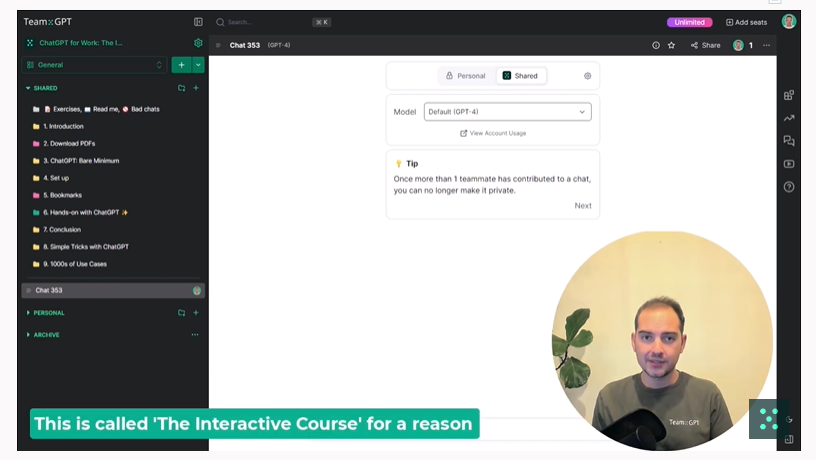
- It’s designed to be as efficient as possible, enabling you to become an AI pro in as little as one hour.
- It teaches you how to implement AI in various critical business operations, enabling you to make AI your and your team’s personal assistant.
So, all it takes to begin is to:
- Start Team-GPT’s free course (to access the interactive part, you’ll just have to sign in to Team-GPT using your Google or Microsoft account).
- Listen to the video course before going to its interactive counterpart for optimal understanding.
- Do all the exercises and try out the prompts in ChatGPT or any other conversational AI engine.
- Start applying the use cases and prompts in real life to enhance your business processes.
Sounds too good to be true?
Don’t take just our word for it, then.
Check out Team-GPT’s Free Interactive Course yourself and discover how easy it is to learn AI with it.
Top 5 tips for learning AI faster
Although mastering AI takes time, some hacks can help you learn it faster and with less hassle.
Here are my tested and tried tips for including AI in your skill set before you know it:
1. Practice beats theory
Instead of diving deep into complex theory from the start, focus on applying AI to real-world business problems.
Look for beginner-friendly tools and platforms, like Team-GPT, that allow you to experiment with AI models without requiring extensive coding knowledge.
With Team-GPT, for example, you can explore all the nuances of conversational AI, learn how to use prompts appropriately, create custom prompt libraries, train AI models to create your bespoke solutions, and much more.

This way, you’ll be able to grasp the practical value of AI and stay motivated to keep learning more.
2. Get acquainted with coding
Having at least basic programming skills can significantly speed up your learning process.
And the best programming language for people with little to no experience is definitely Python, for two reasons.
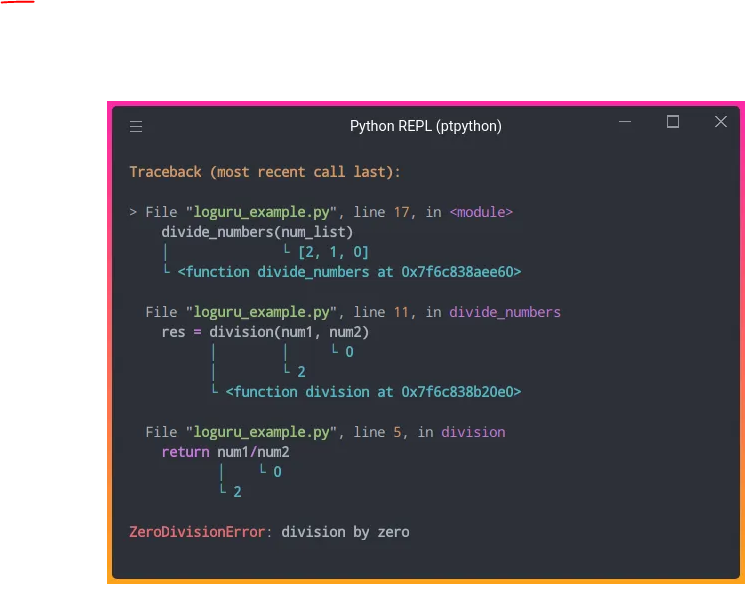
Firstly, it is the easiest programming language for beginners learning AI.
Secondly, it has an abundance of libraries and frameworks tailored for AI, such as TensorFlow, PyTorch, and Scikit-learn.
And don’t worry, you don’t have to learn everything about Python and become a programming pro - just focus on the basics needed to run AI models and work with data.
3. Leverage online courses
Online courses from platforms like Coursera, Udemy, and edX offer structured AI learning paths.
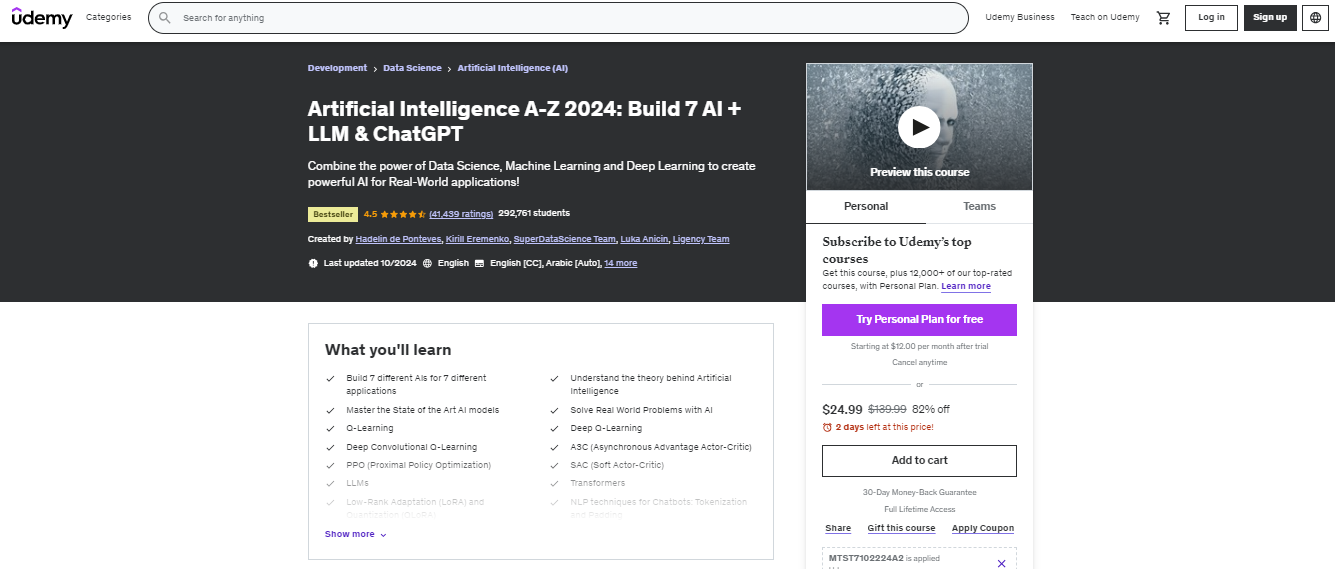
Many courses include hands-on projects that let you apply AI concepts as you learn, which speeds up understanding.
Look for beginner-friendly AI or machine learning courses designed for business owners, and aim for those that combine theory with practical examples and provide lots of room for practice.
4. Start working on small AI-powered projects ASAP
Building small, manageable AI projects will accelerate your learning, allowing you to learn from mistakes and improve accordingly.
Whether it’s setting up a chatbot or using a GenAI model to brainstorm ideas for your content strategy, practical projects help you see how AI works in a business context.
For instance, you can leverage Team-GPT to enable your whole team to adopt AI more quickly by collaborating in AI-driven chats in real-time.

This way, everyone will get a good grasp of AI’s capabilities and viable use cases and learn how to utilize it for optimal results.
5. Join AI communities and relevant forums
Learning from others can dramatically speed up your progress.
Join online communities like Reddit’s AI and machine learning subreddits, Hugging Face, or AI-focused groups on LinkedIn.
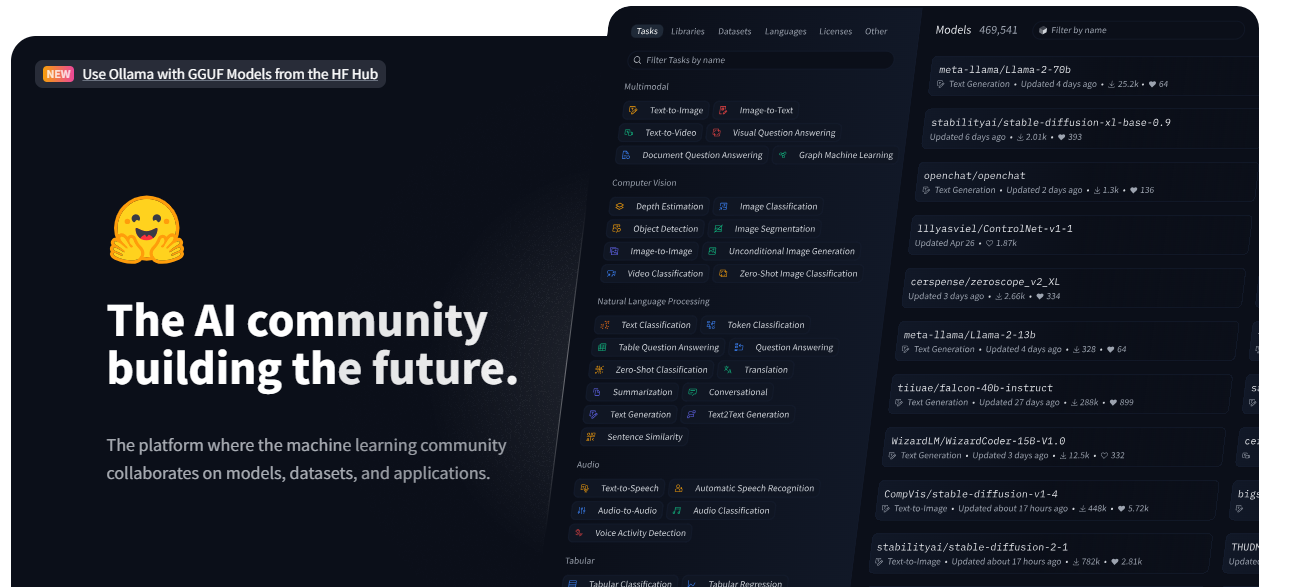
These platforms allow you to ask questions, get feedback, share your own projects, and learn from the experiences of AI practitioners.
Engaging with a community will expose you to new ideas, tools, and resources that can help you learn faster.
What are the best programming languages for AI development?
If you’re bent on building your custom AI model, you’ll need coding.
However, not all programming languages are equally suitable for AI development, especially if you’re a beginner.
Here are some of the best programming languages for AI, ranked from the easiest to master to the most complex, alongside the use cases they excel at:
1. Python
First up is Python, which I briefly mentioned above.
Python is the most widely used language for AI development and for a good reason.
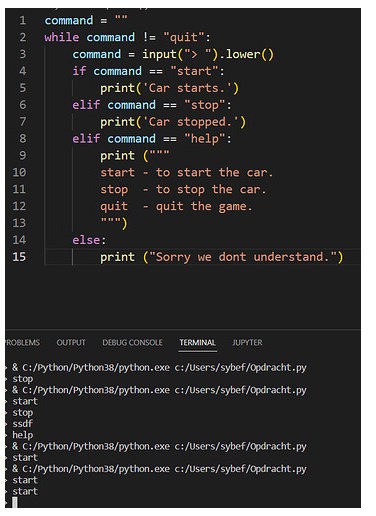
Namely, it is considered the easiest language for AI beginners due to its simple syntax, readability, and the vast amount of resources, libraries, and frameworks available for machine learning and AI development.
Best for: Machine learning, deep learning, NLP, and general AI development.
2. R
R is slightly more complex than Python but is still relatively easy to learn, especially for those with a background in statistics or data analysis.
Namely, R is a powerful language for statistical analysis and data visualization, making it a favorite among data scientists working on AI projects, especially those that require heavy statistical work.
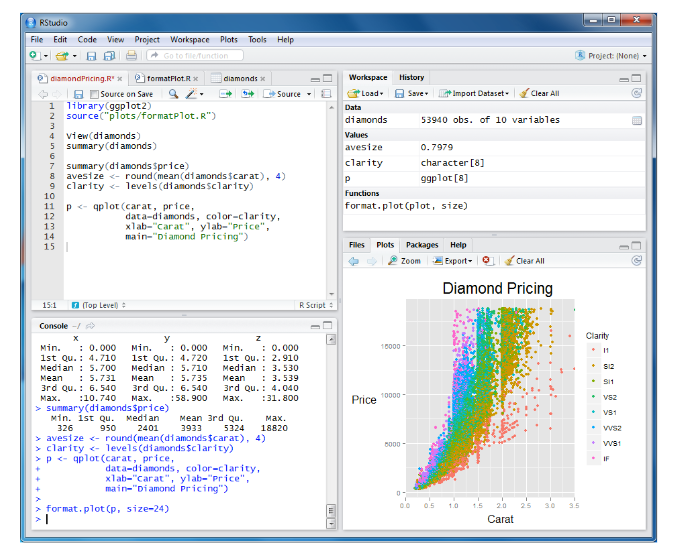
It’s worth mentioning that it has many built-in libraries for statistical computing and machine learning, but its syntax can be trickier for general-purpose programming compared to Python.
Best for: Data analysis, statistical computing, and machine learning.
3. Java
Java’s complexity lies in its object-oriented nature and more detailed syntax compared to Python and R.
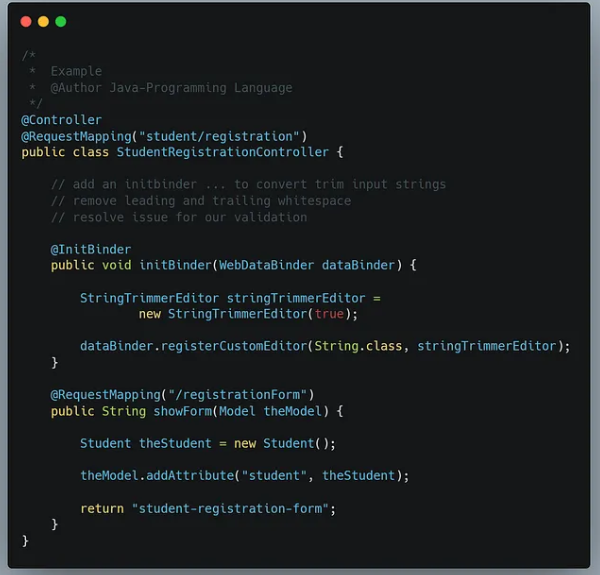
However, it’s widely used in enterprise applications, and once you learn the basics of object-oriented programming (OOP), it becomes more manageable.
Its robust ecosystem and cross-platform capabilities add some learning complexity but make it useful for large-scale AI projects.
Best for: Large-scale enterprise AI applications and real-time systems.
4. Julia
Julia is a newer language that has gained attention for its speed and efficiency in numerical computing, making it ideal for AI projects involving large datasets and heavy mathematical computations.

However, its specialized nature means that it has a steeper learning curve.
Moreover, it is not as common as Python or R, which resulted in fewer learning resources, but it’s easier to grasp than more complex languages like C++.
Best for: High-performance machine learning, numerical computing, and data science.
5. C++
C++ is one of the more challenging programming languages to master due to its complexity in memory management, pointers, and low-level operations.
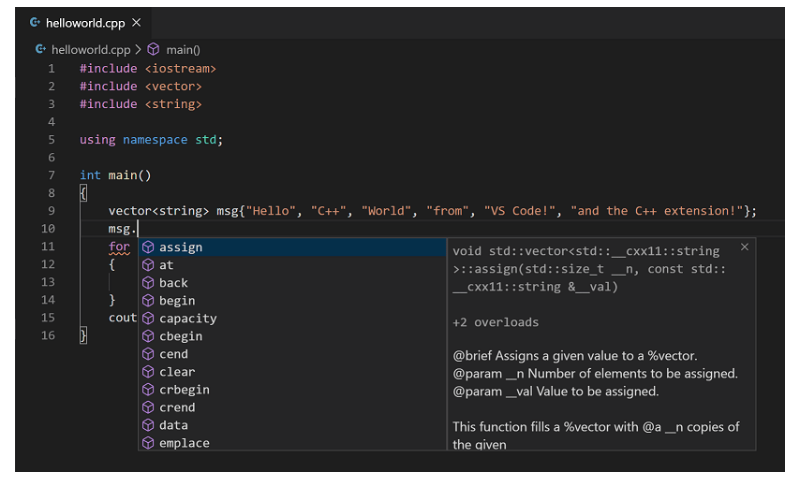
It’s commonly used in AI applications that require performance optimization - such as simulations, game developments, and other projects involving computer vision and neural networks - but the level of control it offers comes at the cost of being difficult for beginners, especially those without a background in computer science.
Best for: High-performance applications, game development, and robotics.
How to stay updated in the AI industry?
AI is a rapidly evolving area, meaning that what’s a hot new trend today quickly becomes a thing of the past tomorrow.
This means you must be dedicated to continuous learning to stay ahead of the curve.
There are several ways you can ensure that you’re always up to date with the freshest and most relevant AI innovations and changes:
- Read AI blogs - This is a no-brainer as blogs have become the cornerstone of learning any new skill and staying in line with relevant news. Focus on blogs that cover all the basics and track what’s new in the AI space for optimal coverage.
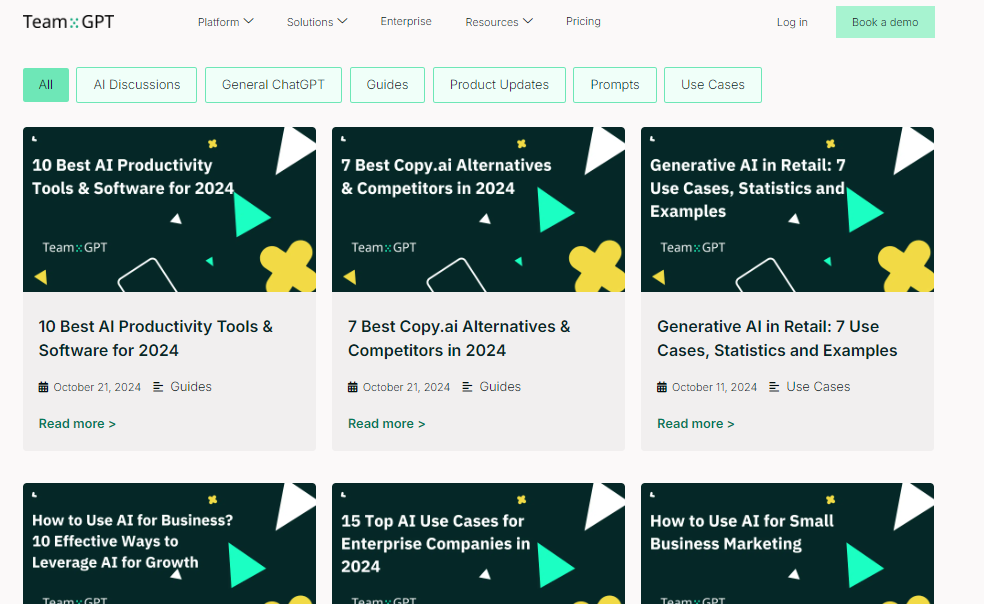
- Follow AI podcasts - If you’re not that much of a reading type, you can always dig up a podcast to listen to. Ensure it comes from a reputable source and is relevant to your industry and specific needs.
- Join AI communities - As I mentioned above, joining AI communities on Reddit, LinkedIn, or any other platform you’re comfortable with can help you learn faster and learn about AI news while they’re still fresh and important.
- Attend conferences - Attending in-person events is always a good idea, so make sure to do so whenever you get the chance. Not only will you get the freshest AI tea right from the horse’s mouth, as these are hosted by AI innovators more often than not, but you’ll also get the chance to network with industry-relevant people.
Common challenges in learning AI and how to best overcome them
Finally, every beginning has unique challenges, trials, and tribulations, and embarking on your AI journey is no exception.
Let’s look at some of the biggest challenges new learners face and explore the best ways of successfully overcoming them:
1. Understanding complex mathematical concepts
If you weren’t a major fan of maths in school, AI must seem extra terrifying to you.
AI involves advanced mathematical concepts such as linear algebra, calculus, and probability theory, which can be overwhelming for beginners.
However, these concepts are crucial for understanding algorithms and machine learning models, meaning you’ll have to get the hang of them if you want to develop your own AI model.
If not, you can technically do without them, but getting at least a little familiar with the entire concept could help you better grasp what AI can and cannot do for you.
How to overcome it: Start by learning the basics of mathematics that are directly applicable to AI, such as probability and introductory algebra. Look for online platforms or specialized AI math courses that break down complex concepts into easy-to-understand lessons. Focus on understanding the intuition behind algorithms before diving deep into the math.
2. Dealing with data quality and quantity
AI is dependent on data, and having clean, structured, and sufficient data is essential.
However, businesses often struggle with messy, incomplete, or insufficient data, making it difficult to train effective AI models.
How to overcome it: Start small by working with publicly available datasets to build your foundational AI knowledge. For your own business data, begin by learning data preprocessing techniques to clean and organize the data for AI models.
3. Choosing the right tools and technologies
The wide array of AI tools, programming languages, and frameworks can be overwhelming. New learners often struggle to decide which tools to use for their specific goals.
How to overcome it: When it comes to programming languages, focus on mastering Python first, as it’s the most popular language for AI development with many beginner-friendly libraries. When it comes to tools, look for those that allow your entire team to successfully adopt AI and leverage its optimal potential, such as Team-GPT.
4. Lack of practical application
Learning AI can sometimes be theoretical and abstract, making it hard for learners to connect the concepts to real-world use cases.
How to overcome it: Hands-on experience is crucial to mastering AI. Courses like Team-GPT’s Interactive Course offer tons of practical examples and let you interact with AI models, helping you bridge theory and practice.
5. Keeping up with AI advancements
The field of AI is rapidly evolving, with new models, techniques, and frameworks emerging frequently. It can feel overwhelming to keep up with the pace of change.
How to overcome it: Focus on mastering foundational AI concepts rather than chasing the latest trends. Once you have a strong foundation, keeping up with advancements becomes easier. Follow trusted AI resources like Team-GPT’s blog or join AI communities on LinkedIn and Reddit to stay updated on key developments. And remember - consistency and discipline are crucial to success in the digital era.
Ready, set, learn!
By now, I’m sure you’ve got a much clearer idea of what to do and where to begin when learning AI and implementing it in your business.
The one key takeaway here is to start slow and focus on detailed courses that provide a perfect mix of theory and practice, allowing you to learn and apply your new knowledge simultaneously - just like Team-GPT’s Interactive Course.
This makes it an excellent starting point for anyone looking to go from beginner to advanced AI user in as little as a week.
Finally, if you’re looking for a way to onboard your whole team or entire organization on AI, Team-GPT can help with more than our course.
Our platform is optimized for teams of all sizes looking to speed up and enhance AI adoption across levels, enabling real-time collaboration in several AI models at once.
Book a demo with our team and learn how we can help you transform complex AI concepts into your most powerful business tool.

![How to Learn AI: Beginners Guide [2025]](https://cdn.prod.website-files.com/68624244a4e6c93a7178a541/686e4e14c9941b4f0c1b9437_Blog-Thumbnails-6.png)